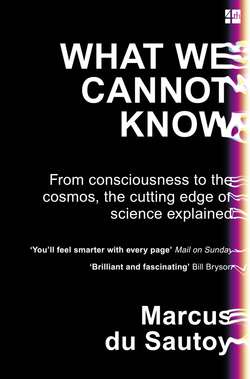Читать книгу What We Cannot Know: Explorations at the Edge of Knowledge - Marcus Sautoy du - Страница 22
NEWTON’S THEORY OF EVERYTHING
ОглавлениеIt was an extraordinary feat. The three laws were the seeds from which all motion of particles in the universe could potentially be deduced. It deserved to be called a Theory of Everything. I say ‘seeds’ because it required other scientists to grow these seeds and apply them to more complex settings than Newton’s solar system made up of point particles of mass. For example, in their original form the laws are not suited to describing the motion of less rigid bodies or bodies that deform. It was the great eighteenth-century Swiss mathematician Leonhard Euler who would provide equations that generalized Newton’s laws. Euler’s equations could be applied more generally to something like a vibrating string or a swinging pendulum.
More and more equations appeared that controlled various natural phenomena. Euler produced equations for non-viscous fluids. At the beginning of the nineteenth century French mathematician Joseph Fourier found equations to describe heat flow. Fellow compatriots Pierre-Simon Laplace and Siméon-Denis Poisson took Newton’s equations to produce more generalized equations for gravitation, which were then seen to control other phenomena like hydrodynamics and electrostatics. The behaviours of viscous fluids were described by the Navier–Stokes equations, and electromagnetism by Maxwell’s equations.
With the discovery of the calculus and the laws of motion, it seemed that Newton had turned the universe into a deterministic clockwork machine controlled by mathematical equations. Scientists believed they had indeed discovered the Theory of Everything. In his Philosophical Essay on Probabilities published in 1812, the mathematician Pierre-Simon Laplace summed up most scientists’ belief in the extraordinary power of mathematics to tell you everything about the physical universe.
We may regard the present state of the universe as the effect of its past and the cause of its future. An intellect which at a certain moment would know all forces that set nature in motion, and all positions of all items of which nature is composed, if this intellect were also vast enough to submit these data to analysis, it would embrace in a single formula the movements of the greatest bodies of the universe and those of the tiniest atom; for such an intellect nothing would be uncertain and the future just like the past would be present before its eyes.
This view that, in theory, the universe was knowable, both past and present, became dominant among scientists in the centuries following Newton’s great opus. It seemed as if any idea of God acting in the world had been completely removed. A God might be responsible for getting things up and running, but from that point on the equations of mathematics and physics took over.
So what of my lowly dice? Surely with the laws of motion at hand I can simply combine the geometry of the cube with the initial direction of motion and the subsequent interactions with the table to predict the outcome? I’ve written out the equations on my notepad and they look pretty daunting.
Newton too contemplated the problem of trying to predict the dice. Newton’s interest was prompted by a letter he received from Samuel Pepys. Pepys wanted Newton’s advice on which option he should back in a wager he was about to make with a friend:
(1) Throwing six dice and getting at least one 6
(2) Throwing twelve dice and getting at least two 6s
(3) Throwing eighteen dice and getting at least three 6s
Pepys was about to stake £10, the equivalent of £1000 in today’s money, and he was quite keen to get some good advice. Pepys’s intuition was that (3) was the more likely option, but Newton replied that the mathematics implied the opposite was true. He should put his money on the first option. However, it wasn’t his laws of motion and the calculus to which Newton resorted to solve the problem but the ideas developed by Fermat and Pascal.
But even if Newton could have solved the equations I’ve written out to describe the trajectory of the dice, there turned out to be another problem that could scupper any chance of knowing the future of my dice. Although Pascal was talking about his wager with God, there is an interesting line in his analysis which throws a spanner in the works when it comes to knowing the future: ‘Reason can decide nothing here. There is an infinite chaos which separated us.’
